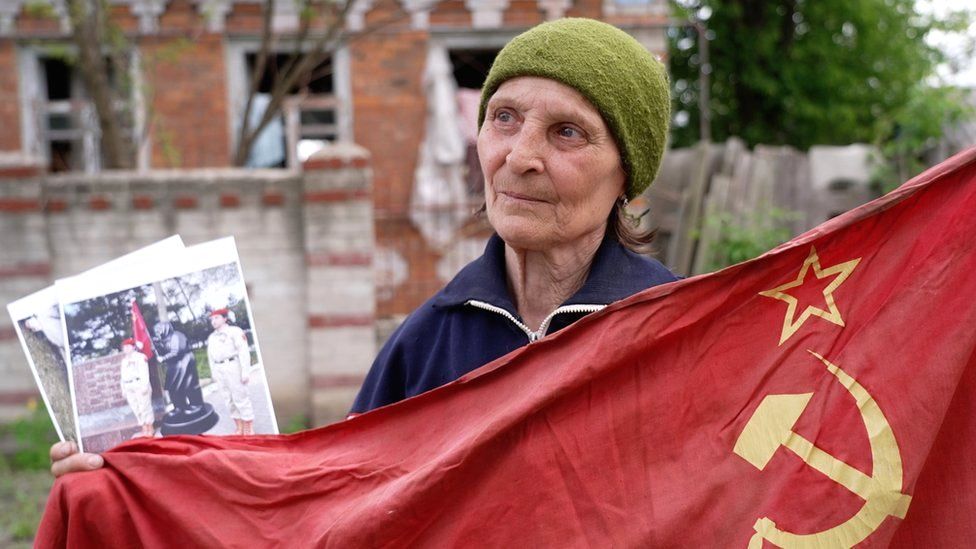Babushka Z: The woman who became a Russian propaganda icon
- Published

An elderly Ukrainian woman brandishing a red Soviet flag has become the unlikely face of Kremlin propaganda after a video of her encounter with Ukrainian soldiers went viral. The BBC tracked down "Babushka Z" to try to establish the truth behind the incident.
"I don't think they should glorify me. I am just a peasant woman. I don't understand why I've become a celebrity."
The woman who has become known as Babushka Z - "grandmother" in Russian, the Z referring to the symbol often painted on armoured vehicles - is gobsmacked when the BBC shows her photos of her newfound fame. "I've never seen any of it," she says.
The video shows her walking towards two Ukrainian soldiers holding a red Soviet flag.
The soldiers say they have arrived to help and offer her a bag of food. Then they take the flag off her, throw it on the ground and stamp on it. So the woman, feeling insulted, gives the food back to them. "My parents died for that flag in World War Two," she says, indignantly.
For the Kremlin, this was gold. Russian propaganda is rarely able to centre on individuals, and they saw this woman as a rare example of a Ukrainian who regretted the collapse of the Soviet Union and considered the Russians to be liberators.
Most Ukrainians - even in Russian-speaking regions - have not welcomed the invasion, so her brandishing of the Soviet flag was used as proof that its actions have support among local people.
And it doesn't hurt that the iconography of that flag and the Babushka resonates for every Russian who is familiar with the WWII postcard of "Mother Russia".
The Kremlin propaganda machine got to work. Within days, her image - a throwback to a stereotypical peasant woman of the Soviet era in her orthodox headscarf, felt boots and thick skirt - started to appear everywhere, from Moscow and Siberia to Sakhalin Island in the far east.
She has now been immortalised in murals, placards, postcards, sculptures and bumper stickers. Songs and poems have been dedicated to her. Russian officials even unveiled a statue of her in Mariupol, the Ukrainian city that has been bombed to the ground.
Until recently, no one knew the true identity of Babushka Z. In fact, nobody was sure if she was even alive.
But she is a very real person. Her name is Anna Ivanovna and we tracked her down to Velyka Danylivka, a village near Kharkiv in north-eastern Ukraine where she lives with her husband, dogs, cats and rabbits.
The lively 69-year-old looks surprised when we show her pictures of the statue made in her image. "Do I really look so old?", she asks. "It's like a stranger is staring at me!"
But her story is very different from the image that the Russian media has been painting. She does not support the war.
"How can I support my people dying? My grandchildren and great-grandchildren were forced to go to Poland. We live in fear and terror."
So why did Anna greet soldiers with a Soviet flag? She says she has been misunderstood. She claims she confused the two Ukrainian soldiers offering her food with Russian soldiers.
"I was just happy that Russians would come and not fight with us. I was happy that we would unite again."
Anna did not put any political subtext into her act. The red flag, she says, is not the flag of the Soviet Union, not of Russia, but "the banner of love and happiness in every family, in every city, in every republic. Not of bloodshed. And whoever says otherwise, is wrong."
While Anna talked, the constant roar of artillery and fighting could be heard nearby. She didn't flinch once - she has become used to it.
"If I could speak to Vladimir Putin I would say, you've made a mistake. Us Ukrainian workers, what have we ever done to deserve this? We are the ones who are suffering the most."
But Anna is from the Soviet time, and reluctant to openly criticise the Russian leader.
"Putin is a president. A tsar, a king, an emperor."
Even though she has become a star in Moscow, Anna's village has not been spared by Putin's forces - it has been bombed several times.
As we drive through, some houses are on fire. Others have been reduced to ashes. Her own home has suffered from the shelling - her windows are shattered, the roof is damaged and shrapnel is scattered on the front lawn.
"'Now I see," Anna said. "They do not care about people here in Ukraine, they care only about conquering our lands."
Dmytro Galko from Ministry of Culture of Ukraine agrees. He says Russian propaganda makes everything one dimensional.
"They just do not care about the truth, they do not care about real persons. They are not interested in who Anna is, or in her fate. If they could, they would snatch her, mummify her and put her in a mausoleum," he says.
Anna fears for her safety now. In Ukraine, she is being attacked online because she is seen as pro-Russian.
All her neighbours shun her. It's a small village and everyone knows each other.
"I'm not happy they've made me famous. Because in Ukraine, now they consider me a traitor."
But it's clear that the true scale of her fame only really becomes apparent to Anna at the end of our interview. As we say goodbye to her, she tries to give us her beloved red flag with the sickle and hammer.
"I don't want any trouble. I don't want people to ever use it against me."
Related Topics
- Published7 March 2022